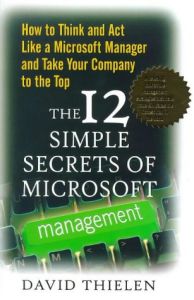Join getAbstract to access the summary!

Join getAbstract to access the summary!
David Thielen
The 12 Simple Secrets of Microsoft Management
How to Think and Act Like a Microsoft Manager and Take Your Company to the Top
McGraw-Hill, 1999
What's inside?
Microsoft Management: Bill is watching.
Recommendation
David Thielen presents Microsoft’s management principles, which are the secrets to its marketplace dominance. He includes ample examples of what Microsoft does right and what most other corporations do wrong. You will learn why Microsoft’s focus makes it the hardest company in the world to compete against. Yet, you will also find nuggets of management information that can be applied to your own workplace environment. Thielen has written a direct, refreshing, and sometimes brutal book. This book will intrigue any business person who would like a quick review of the management principles that have guided Microsoft’s success.
Summary
About the Author
David Thielen has spent more than 20 years on the bleeding edge of technology, including working as a senior software developer on Windows 95 and several other projects. Currently he is working as the director of software development for a hi-tech company. Thielen is the author of No Bugs! and Writing Windows Virtual Device Drivers. He has written 22 articles for magazines including The New Republic, PC Magazine, and Microsoft Systems Journal.


















Comment on this summary